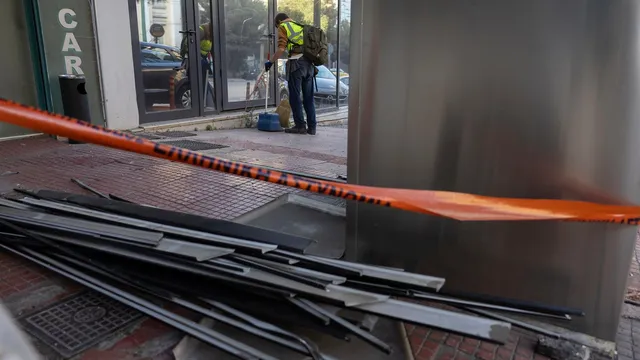
Bomb explodes outside Hellenic Train offices amid public anger
2025-04-13 20:33- A bomb was detonated near the Athens offices of Hellenic Train, causing limited damage but no injuries.
- The explosion is linked to ongoing public outrage following a tragic railway disaster in February 2023.
- Authorities are investigating the incident and exploring connections to political accountability for railway safety.
Express your sentiment!
Insights
In Greece, a bomb exploded near the offices of Hellenic Train, the country’s main railway company, on Friday, causing limited damage but no reported injuries. This incident occurred in central Athens, an area particularly crowded with residents and tourists. The explosion transpired amidst heightened public anger over a railway disaster that happened over two years prior, which claimed the lives of 57 people, mainly young university students. Following the explosion, authorities began immediate investigations, including gathering evidence from the site, where a bag containing the explosive was found. The railway disaster in February 2023 continues to provoke outrage regarding the government's failure to ensure railway safety and political accountability. The event led to numerous public protests, particularly in light of the second anniversary of the tragedy, during which demonstrators expressed frustrations related to perceived inadequacies in the government's reaction and handling of the aftermath. Lawmakers in parliament have debated the former cabinet officials' responsibilities, reflecting the ongoing tension surrounding the events related to various delays in accountability. In addition to the physical explosion, this act of violence reflects a broader trend of politically motivated violence in Greece, where domestic extremist groups have historically engaged in bombings and other attacks. The spike in such violence has been characterized by public calls for responsibility and immediate action from the government. Critics argue that members of the government have evaded accountability, deepening public distrust. Hellenic Train condemned the attack, stating that it undermines societal progress and contributes to an atmosphere of tension and violence that is counterproductive to public safety. The aftermath of the explosion has raised alarms regarding safety protocols in densely populated urban areas, particularly as the device was left in a vicinity known for its bustling nightlife and pedestrian activity. Local authorities have implemented immediate security measures to assure the safety of residents and mitigate any potential risks of further violence or attacks. Overall, this incident has ignited discussions on both safety and accountability within the Greek transport system, with public sentiment demanding immediate and effective government responses.
Contexts
The history of railway safety issues in Greece is marked by several significant incidents that underscore the ongoing challenges faced by the railway system in the country. Over the years, the safety of rail travel has been scrutinized, particularly in light of accidents that have resulted in serious injuries and fatalities. These events have prompted investigations and discussions regarding the robustness of safety protocols and infrastructure. One of the most notable tragedies occurred in the late 20th century, which served as a wake-up call for stakeholders to prioritize safety enhancements within the railway sector. Despite various upgrades and modernizations over the years, the railway system in Greece has struggled with outdated infrastructure and inadequate maintenance practices. Reports and audits have indicated that a significant proportion of railway lines lack proper signaling systems, which has contributed to a higher risk of collisions and derailments. Furthermore, insufficient investments in safety training for personnel have often resulted in a workforce that may not fully adhere to best practices in railway operation and safety. Consequently, the need for comprehensive reforms has been a focal point in discussions surrounding railway safety in Greece. In recent years, the Greek government, in collaboration with European Union officials, has initiated a series of measures aimed at improving safety standards on the railways. Investments have been made to upgrade signaling technology, enhance track maintenance programs, and implement rigorous training protocols for railway employees. Nevertheless, the effectiveness of these measures has yet to be fully realized, as there have been instances where lapses in safety procedures continue to pose risks for passengers and freight transport alike. Ultimately, the history of railway safety issues in Greece illustrates the critical need for a dedicated and sustained commitment to improving safety measures. Comprehensive strategies must be developed and enacted to not only address existing challenges but also to anticipate future risks. Continued investment in technology, infrastructure, and personnel training is essential to ensure that the railway system can provide safe and efficient services to the public, thereby restoring confidence in rail travel as a secure mode of transportation.